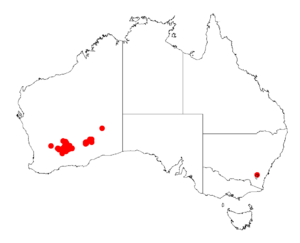Acacia inaequiloba facts for kids
Quick facts for kids Acacia inaequiloba |
|
|---|---|
| Scientific classification | |
| Genus: |
Acacia
|
| Species: |
inaequiloba
|
 |
|
| Occurrence data from AVH | |
Acacia inaequiloba is a type of shrub that belongs to the Acacia plant family. It is found only in the southwestern part of Australia.
What it Looks Like
This plant is a small, bushy shrub with many stems. It usually grows to be about 0.15 to 0.6 metres (0.5 to 2.0 ft) tall. It also has a strong smell. Its branches are straight and stand upright. They are stiff, have sharp points (like spines), and are usually smooth (without hairs). Often, these branches have a white, powdery look.
Like many other Acacia plants, it doesn't have regular leaves. Instead, it has special leaf-like parts called phyllodes. These phyllodes stay green all year. They can be different shapes, but often look like a triangle with a wider top, or a very narrow oval. They are not perfectly even on both sides.
The phyllodes have a sharp point and are a dull grey-green to blue color. They are about 1 to 4.5 cm (0.39 to 1.77 in) long and 2 to 10 mm (0.079 to 0.394 in) wide. They have a main vein running along one edge, and other smaller veins that are hard to see. This plant produces yellow flowers, usually between July and September.
Where it Grows
Acacia inaequiloba is found in the Wheatbelt and Goldfields-Esperance areas of Western Australia. It often grows on sandy plains, in sandy soil that contains a type of rock called laterite.
You can find this shrub from places like Southern Cross and Coolgardie in the west. It stretches all the way to Queen Victoria Spring and the Streich Mound. The Streich Mound is about 200 km (120 mi) northeast of Kalgoorlie.

